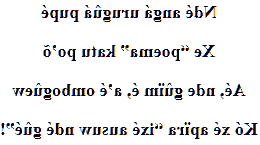Poromongûetá love poem
Urugûà
Ndé angá urugûá pupé
Xe “poema” katu po’õ
Aé, nde gûïm é, a’é ombogûew
Kó xé apïra “ixé ausuw ndé gûé”!


→ French poem ←
Poromongûetá language
Para começar, quero dedicar esta página a quem fez esta tradução, e mais particularmente a todos os membros de sua família, que foram levados por covid19.
Here is a language you have probably never heard before, poromonguetá, and for good reason, Mbo'esara Esãîã, an anthropologist who is part of the Tremembé people, is surely the first person to speak about it. Poromonguetá (tremembé, taramembé), is the language of the Tremembé, an ethnic group originating from the coastal region of northeastern Brazil (states of Ceará, Maranhão and Piauí).
If for many, it's a language considered as isolated, whose origin is unknown, and which is distinct from the many "Tapuia" languages that surround it, this is not the result of Mbo'esara Esãîã's research, who considers Poromonguetá to be a dialect of ancient Tupi.
Anthropological studies affirmed that this language disappeared a long time ago, due to colonization, and tupinization of the entire coastal region, cradle of the Tremembes.
If we succeeded in finding a language with a strong Tupi-Guarani base that they spoke later, but not their old mother tongue, it is because the studies had not been carried out in all the places where we could find them. In particular in the states of Ceará and Maranhão, where despite the tupinization and mixing of populations, some Tremembés have succeed to keep some of their cultural traits (the songs of Torém, the way to make the mocororó, and shamanism for example).
The word tremembé comes from tïrïmembé, the name given to the wetland bordering the coast, and it is the name with which this ethnic group was designated by other peoples (the people of tïrïmembé). As for the word poromonguetá, which comes from tupi, it means (the language of men and spirits).
I totally agree with these words that Mbo'esara Esãîã quotes on his blog about Poromongûetá : "to reappropriate a language which is ours, is to retake aspects of a new worldview, a new way of looking at the world. To reinforce our unique and solid identity.", and I renew my trouble, in front of all these languages which are disappearing.
The Tremembés
The Tremembés are an ethnic group, originating from the northeastern coastal region of Brazil. Almofala was the most representative colony, and when it closed, lands were given to the Indians who lived there (late 18th century) "Terra Indígena Tremembé de Almofala" et "Terra Indígena Tremembé de Queimadas" ... lands, which were quickly invaded by landowners.
Today the descendants of the Tremembes are more dispersed. If Itarema, Itapipoca and Acaraú, are the more representative cities for their concentration, other members of this ethnic group, are dispersed along the coast of Ceará, for example in Jericoacoara, and Camocim.
If they only speak Portuguese, the Tremembes retain traces of their language, through a style that is specific to them, and differences, compared to the other local populations, in the use of phonetics. The songs of Torém, which they sing during this ritual dance, on a background of sacred music, contain many words from their ancient language, mixed with others that are of Tupi origin.